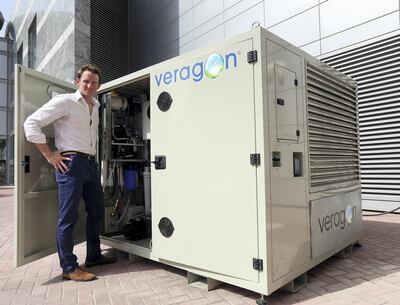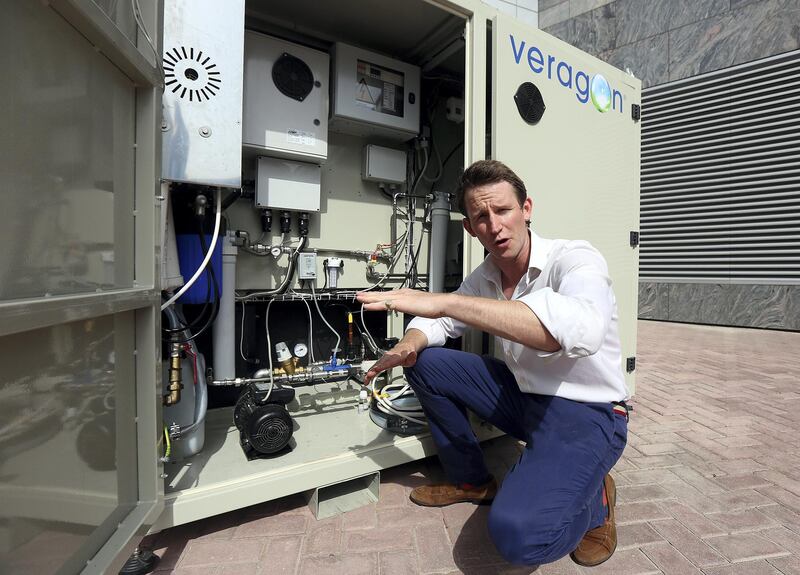Back in 2012, when Dr Alessio Lucatelli travelled to do some medical relief work in Haiti, he and his fellow volunteers faced a profound lack of access to safe water – both to drink and to clean vital medical equipment.
The Italian physician couldn’t let the matter go even after returning home, and so began researching the science and technology behind turning air into water. That’s how he ended up starting Veragon Water Solutions – a company that is literally making water out of thin air – 18 months ago.
“It’s sustainable, costs a tiny fraction compared to bottled water, there’s no need for polluting plastic bottles,” says Dr Lucatelli. “It can be freely available in some of the world’s harshest environments.”
The United Kingdom-based Veragon is already having a big year, having officially launched in Dubai in March. Middle East markets were the first port of call for the product, says Veragon’s chairman David Painter, because the region offers ideal conditions for the technology, with average temperatures at about 30°C and humidity in the 60 to 70 per cent range.
“We need to have a certain level of temperature and a certain level of humidity to have good production levels, so as you look around that central band of the globe, it’s South East Asia, it’s the Middle East, it’s south and a bit of North America and it’s Africa, where you’ve got guaranteed supplies of humidity and good temperatures consistently,” says Mr Painter.
Among those who have taken up the Veragon cause is Dubai-based Kestrel Global, which works with some of the region's most innovative companies delivering high-tech solutions to problems ranging from water shortage to supersonic travel and health care to the judiciary. As well as Veragon, Kestrel counts Tesla and the UK online medic service Babylon health among its clients. Kestrel's roster of specialists includes Harry Amos, the firm's Middle East strategic advisory head and a former captain in the British Army.

There are at least a half-dozen other companies pulling condensation from the air, some operating since the 1990s and drawing energy from a variety of sources, including wind and solar. Kestrel
The Australian actress Miranda Kerr, for example, has a Skywater system that provides all the water she uses at her home in Malibu, California.
Jens Berggren, director of communications for the Stockholm International Water Institute, says such technology has been considered “fringe” and can still be energy intensive.
“There are so many other things you could do in most water systems before you would bring in these types of technologies,” he says, suggesting managing demand and purifying used water as better options.
Yet when asked about air-to-water technology, the consulting firm Frost&Sullivan says it is ideal for the Middle East and Africa's remote communities, gas and construction sites. Done properly it can leave a smaller energy footprint than taking water from lakes, rivers and seas, particularly in the case of desalination, especially if it is generated and used at the same place, according to the consulting firm.
Veragon seems to have tackled the energy intensity issue, as evidenced by the recent fruits of their partnership with Thin Air, a group of four students from Imperial College London.
_______________
Read more:
While Cape Town suffers, lessons for others can be learned
Shoppers in Dubai generating half a kilo of waste on average mall trip
_______________
The Thin Air group, which created a thin membrane inspired by a Namibian desert beetle that is able to “drink” water droplets from the air by gathering them from bumps on its wings, is among five teams shortlisted for the Water Abundance XPRIZE, which aims to reduce the environmental damage done by desalination plants.
With $1.5million up for grabs, and round two announced in July, the challenge was to use renewable energy to take 2,000 litres of water per day from the atmosphere, at a cost of no more than two cents per litre.
Veragon’s smallest system produces 1,000 litres of safe drinking water per day for Dh.03 – less than one US cent – per litre, based on a 10-year life span for the capital cost of the equipment and power requirements.
The firm is also offering a rarity as part of its system: added minerals, which the body needs to function optimally and are absent from other water solution technologies.
In Veragon's system, air enters the machine and passes through filters, where it is cleared of dirt and dust. It is then condensed on cooled panels, turning into drops of water and collected in large water tanks. The water is sanitised using ozone before sodium, magnesium, potassium and calcium are added. It is then chilled and treated with UV light to protect it from outside bacteria – all to required standards, with approvals from the World Health Organisation and Dubai Municipality.
Veragon's units are available in 1,000, 2,000 and 5,000-litre capacity, with the systems starting from Dh195,000.
The product has been tested and approved by the United Nations World Food Programme, Nato, the Italian armed forces and the British army. It is also undergoing trials with the US military.
In the UAE, Veragon recently completed the Dubai Future Accelerator programme and partnered the private equity firm Eshara Capital. The company, which now has six employees in Dubai and is recruiting for more, has opened an office in Al Sila Tower at Abu Dhabi Global Markets.
Veragon has one unit on trial at the Dubai Expo 2020 head office cafeteria and two pilot projects underway with the Dubai Electrical and Water Authority. It is also involved in a corporate social responsibility project with the Mai Dubai bottled water company, which is partially funding the cost of a Veragon unit that will be donated to the UAE Water Aid project in Suqia, Nigeria.
One of the biggest challenges in the sector – and region – is explaining how the system works, says Mr Painter.
“Each market you basically have to go through a process of making the people in the water business aware of the technology,” he says. “Then you have to translate that into applications and then you have to get people comfortable with using the machines.”
For now Veragon is concentrating on commercial and corporate customers, as well as helping out on the humanitarian side, but it is looking to sell to domestic customers in the future.
The main objective of the business is sustainability, Mr Painter says. That’s why Veragon’s future goals go beyond producing air-to-water machines to providing water in resusable packages for the consumer.
“So we see the value chain in the business being more directed into the water product rather than the machine product,” he says.






